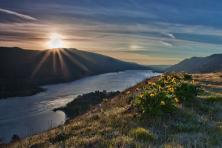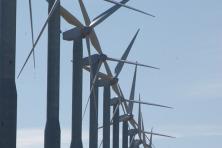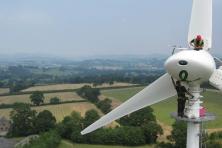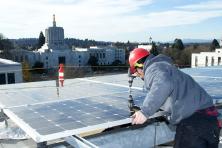We are nearly halfway through the year, and 2016 is already proving to be one for the record books. Temperatures have hit historic highs in Oregon and around the world. At the same time, momentum and investment in clean energy solutions are also increasing rapidly. My own feelings fluctuate between anxiety about the increasingly apparent changes to the climate, and optimism about the clean energy transition that is well underway – particularly in our region. Fortunately, Oregonians have many good reasons to be hopeful.
Big Steps Forward in Clean Electricity, Clean Fuels, and Business Leadership
Oregon took a giant step toward clean electricity this past legislative session. With passage of the Clean Electricity and Coal Transition Act, Oregon became the first state to say no to coal power by legislative vote. By doubling the Renewable Portfolio Standard to 50%, Oregon also raised the bar for clean electricity in other states and created one of the cleanest electricity grids in the nation. The legislation also supports community solar projects and electrification of our transportation system, a critical next step to achieving the state’s climate goals.
2016 also marks the start of Oregon’s Clean Fuels program, which reduces carbon and other pollutants from cars and trucks. The program is getting underway, with companies starting to announce their participation in the program. Fred Meyer, for example, is buying 500,000 gallons of gas derived from organic waste to power its trucks. Other clean energy opportunities are emerging as well. Iberdrola, one of the world’s largest clean energy companies, announced plans for the first utility-scale solar plant in Eastern Oregon.
Stopping Oil Trains and Coal Terminals
The recent oil train disaster in Mosier reminds us that our region is still threatened by the specter of fossil fuels. In the last few months alone, hundreds of thousands of people have opposed new coal and oil facilities in the Northwest, including the nation’s largest proposed oil-by-rail project at the Port of Vancouver, only minutes from downtown Portland, and the largest coal terminal proposed in North America in Longview, Washington, right along the Columbia River. Efforts to ship coal and oil from Northwest ports to Asia have expanded as the market in the US has declined, yet investment in new coal and oil infrastructure is dangerous and unnecessary.
West Coast Regional Leadership

Regional leadership on climate took center stage on June 3 as Oregon Governor Kate Brown joined Governors Jay Inslee and Jerry Brown, British Columbia’s environment minister Mary Polak, and the mayors from six major West Coast cities to approve a pact to advance the region’s clean energy economy. The Pacific North America Climate Leadership Agreement builds on existing partnerships between Oregon, California, Washington and British Columbia to accelerate climate solutions on the ground in our region which represents the world’s fifth largest economy.
A Bright Future Ahead
As the evidence from Oregon shows, a rapid transition to a low-carbon economy is possible, practical, and necessary. That’s why Climate Solutions has launched the Bright Future initiative to demonstrate how we can achieve a clean energy transition over the next three decades.
Oregon faces a range of opportunities to protect our climate, improve the health of our communities, and grow our economy, including modernizing and cleaning up our transportation system, reducing energy use in our buildings, and holding our major polluters accountable. We look forward to working with many others in the months ahead to identify Oregon’s next steps. The bright future looks near in Oregon.




